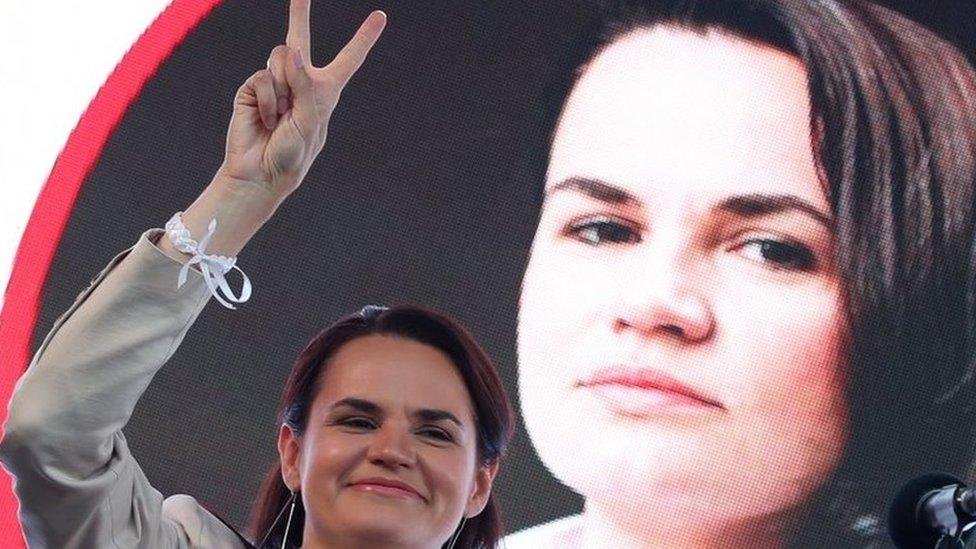Belarus election: 'Widespread torture' inflicted on jailed protesters
- Published
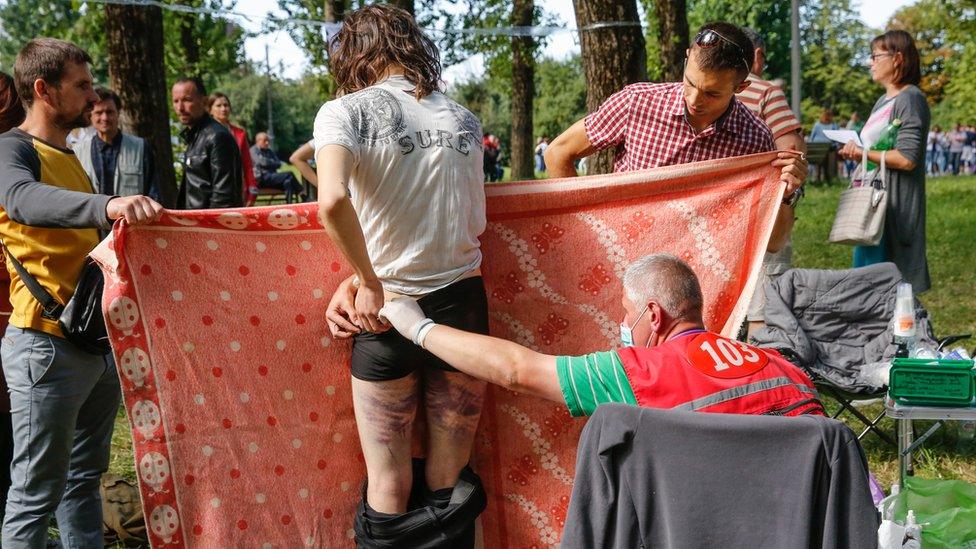
Detainees freed on Friday were given medical treatment outside the Minsk detention centre
Belarus's main opposition figure, Svetlana Tikhanovskaya, has called for an end to violence against protesters, while urging more rallies this weekend.
Freed detainees have given details of beatings during days in custody that Amnesty International said suggested "widespread torture".
Detained for seven hours herself after Sunday's disputed presidential vote, Ms Tikhanovskaya has fled to Lithuania.
With the EU mulling new sanctions, Belarus promised to free all detainees.
Some 6,700 have been detained since protests erupted on Sunday evening. At least two people have died and many more have been wounded.
Belarus is seeing a sixth day of protests since the presidential vote, rejected by the EU and US as neither free nor fair. European Commission President Ursula von der Leyen has backed further sanctions "against those who violated democratic values or abused human rights".
Alexander Lukashenko, in power since 1994, was declared the victor by election authorities, but Ms Tikhanovskaya's supporters insist she won. Announcing final results on Friday, the Central Election Commission said Mr Lukashenko had won 80.1% of the vote and Ms Tikhanovskaya 10.12%, state media said.
In her first statement for days, the main opposition candidate said that where votes had been properly counted she had won support ranging from 60% to 70%, rather than the 10% given to her by the election committee.
'Human life is the most precious thing': Svetlana Tikhanovskaya speaks out from exile
Calling on mayors across Belarus to organise "peaceful mass gatherings" on Saturday and Sunday, Ms Tikhanovskaya said: "Belarusians will never want to live with the previous government again. The majority do not believe in his victory."
'Torture chambers'
The BBC has spoken to several people, including teenagers, who have described being beaten.
"They beat people ferociously, with impunity, and they arrest anyone. We were forced to stand in the yard all night. We could hear women being beaten. I don't understand such cruelty," one man said as he showed the BBC his bruising.
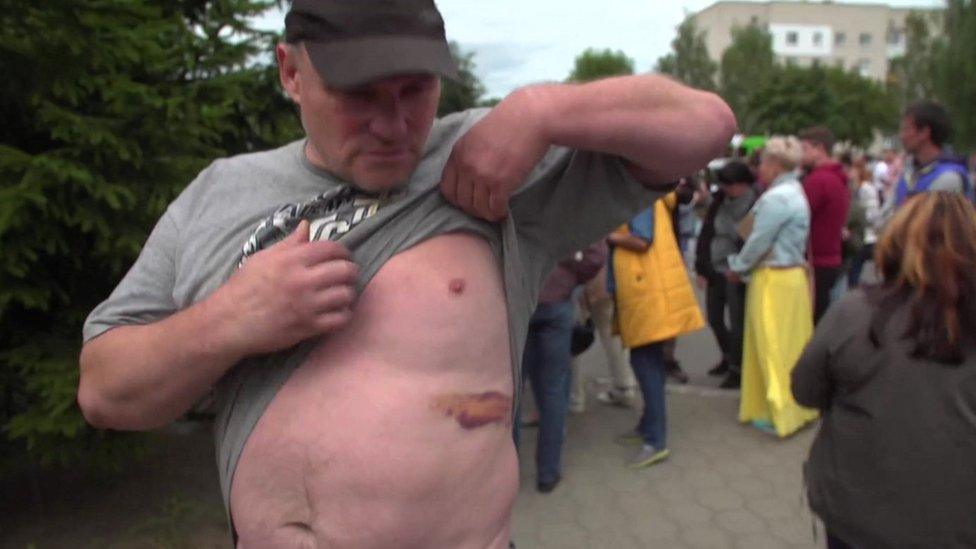
As detainees were allowed to leave the notorious Okrestina detention centre they revealed their wounds
In a statement on state television, Senate speaker Natalya Kochanova said the president had ordered an investigation into the mass detention of protesters, and that more than 1,000 had been freed.
All the remaining detainees were to be released on Friday morning, Deputy Interior Minister Alexander Barsukov said, while denying that prisoners had been abused.
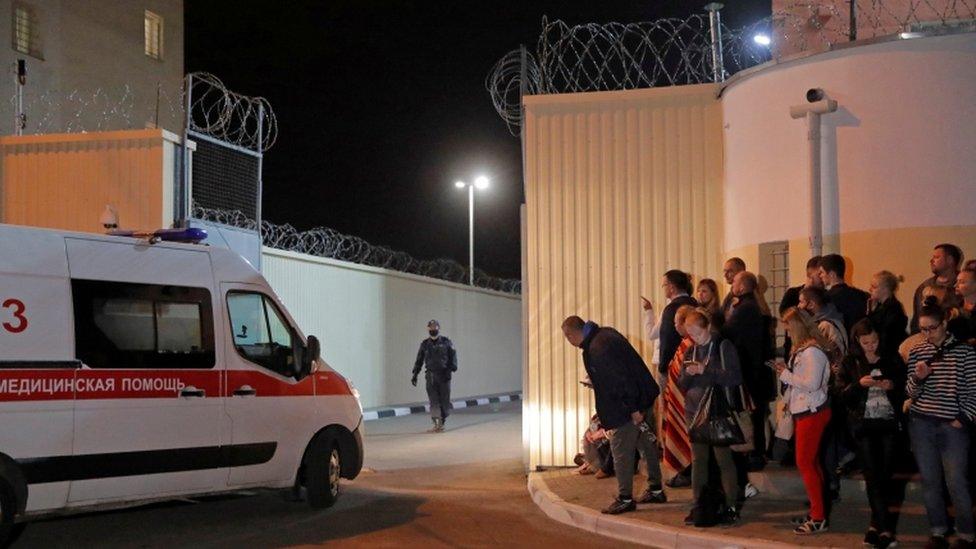
Relatives and friends of detainees wait outside Okrestina detention centre in Minsk
Released prisoners shared pictures showing their bruised and swollen bodies, including injuries to backs and buttocks that they alleged were caused by police.
Amnesty International said detainees described being stripped naked, beaten and threatened with rape.
"Former detainees told us that detention centres have become torture chambers, where protesters are forced to lie in the dirt while police kick and beat them with truncheons," said Marie Struthers, Amnesty International's director for Eastern Europe and Central Asia.
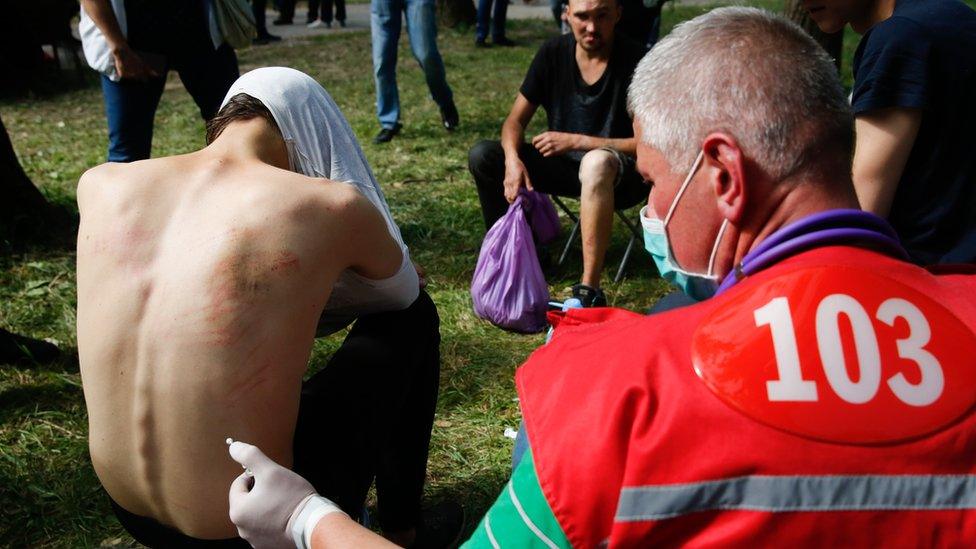
Detention centres "have become torture chambers", said Amnesty International
In audio shared by a BBC journalist, screams could be heard from inside the Okrestina detention centre in the capital Minsk.
Among the testimony to emerge from freed detainees, journalist Nikita Telizhenko published a harrowing account of three days inside prison for Russian news website Znak.com.
He described people lying on the floor of a detention centre, piled on top of each other, in a pool of blood and excrement. They were not allowed to use the toilet for hours on end or even change position.
What will the EU do?
EU foreign ministers are meeting on Friday to consider possible sanctions on Belarus because of the crackdown. The bloc has imposed sanctions before but eased the measures several years ago when President Lukashenko released other detainees.
Czech Prime Minister Andrej Babis said sanctions should be imposed "until free and transparent elections are held in Belarus with the participation of international observers". He said he had the support of Poland's Mateusz Morawiecki, who said he would put forward a "solidarity with Belarus" plan on Friday in the Polish parliament.
The EU has already dismissed the presidential vote as "neither free nor fair", an assessment backed by US Secretary of State Mike Pompeo. Lithuania's president has said Mr Lukashenko is no longer Belarus's legitimate leader.
Ahead of the emergency EU meeting, Belarus Interior Minister Yuri Karayev said he took responsibility for injuries suffered by bystanders, and wanted to apologise to "people who didn't mean to be there… bystanders, people who couldn't run away on time".
Foreign Minister Vladimir Makei said his country was ready for "constructive and objective" talks with other countries.
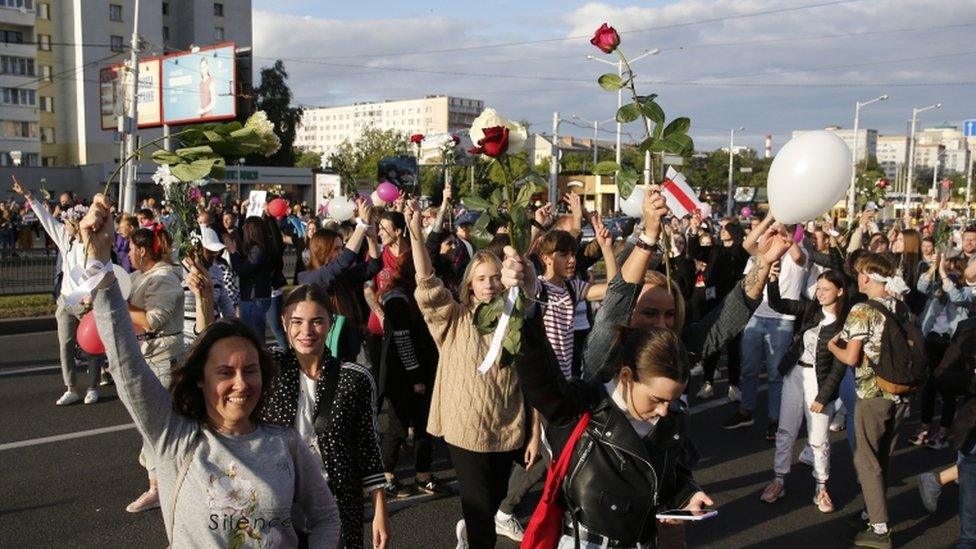
Protests continued for a fifth day on Thursday
Observers said that recent statements and the release of the prisoners indicated a more conciliatory approach from Belarus authorities.

More about the protests in Belarus
LETTER FROM MINSK: Shocked by violence, people lose their fear
SPREADING THE NEWS: How messenger app bypassed blackout
PROFILE: The stay-at-home mum challenging Belarus's longtime ruler
THE CONTEXT: Five things you may not know about Belarus

How protests are continuing
Belarusians returned to the streets of several cities on Friday, for a sixth day of protests since Sunday's election. Footage broadcast by messaging app Nexta on Thursday night showed demonstrators chanting "get out".
In the western city of Grodno, workers massed outside a management office, demanding fresh elections, and car workers gathered in big numbers at the Maz plant in Minsk.
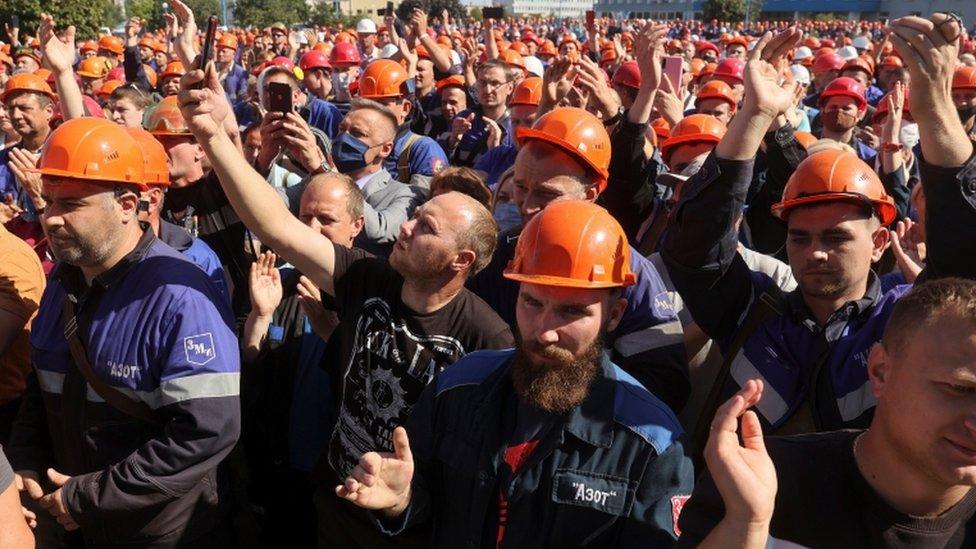
These workers at the Azot company in Grodno joined a protest on Friday
Several strikes have been reported at state-owned factories. Hundreds of employees were seen walking out at truck-maker Belaz in Zhodino to the north-east of the capital. Mr Lukashenko condemned "attempts to inflame workers", in remarks reported by Belta news agency on Friday.
Meanwhile, the head of Belarus's top football club, Bate Borisov, symbolically dumped his old police uniform in the bin. In an Instagram post, Mikhail Zaleuski said he could no longer bear to see the "impunity of people with batons and the lawlessness of power".

Protesters continued to form "solidarity chains" and held flowers in several cities to object to police brutality.
Opposition figure Maria Kolesnikova joined thousands of female protesters in Minsk on Thursday. She was one of three women who pooled their resources to spearhead the opposition.
Ms Tikhanovskaya, 37, was a stay-at-home mother until she entered the race after her husband was arrested and blocked from registering for the vote. She then led big rallies during the election campaign.
- Published11 August 2020
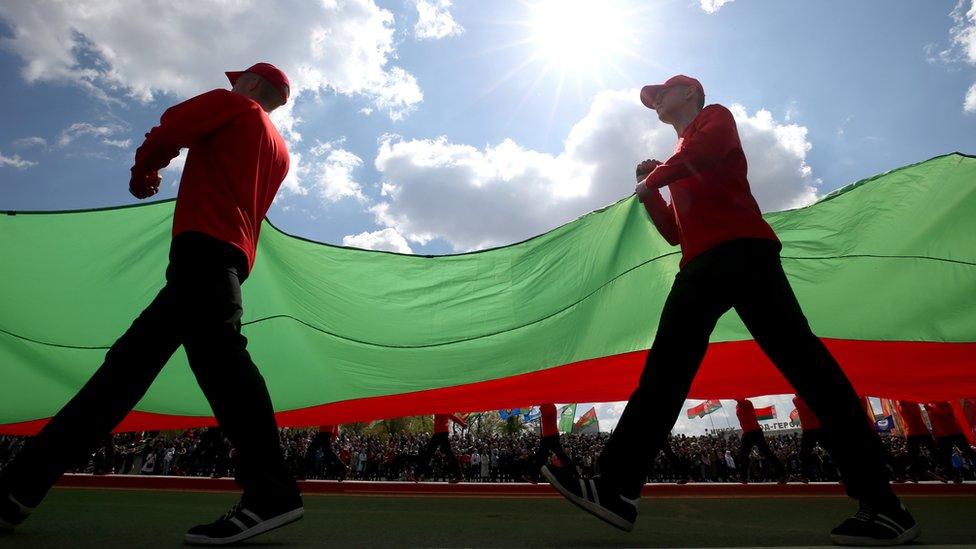
- Published13 August 2020
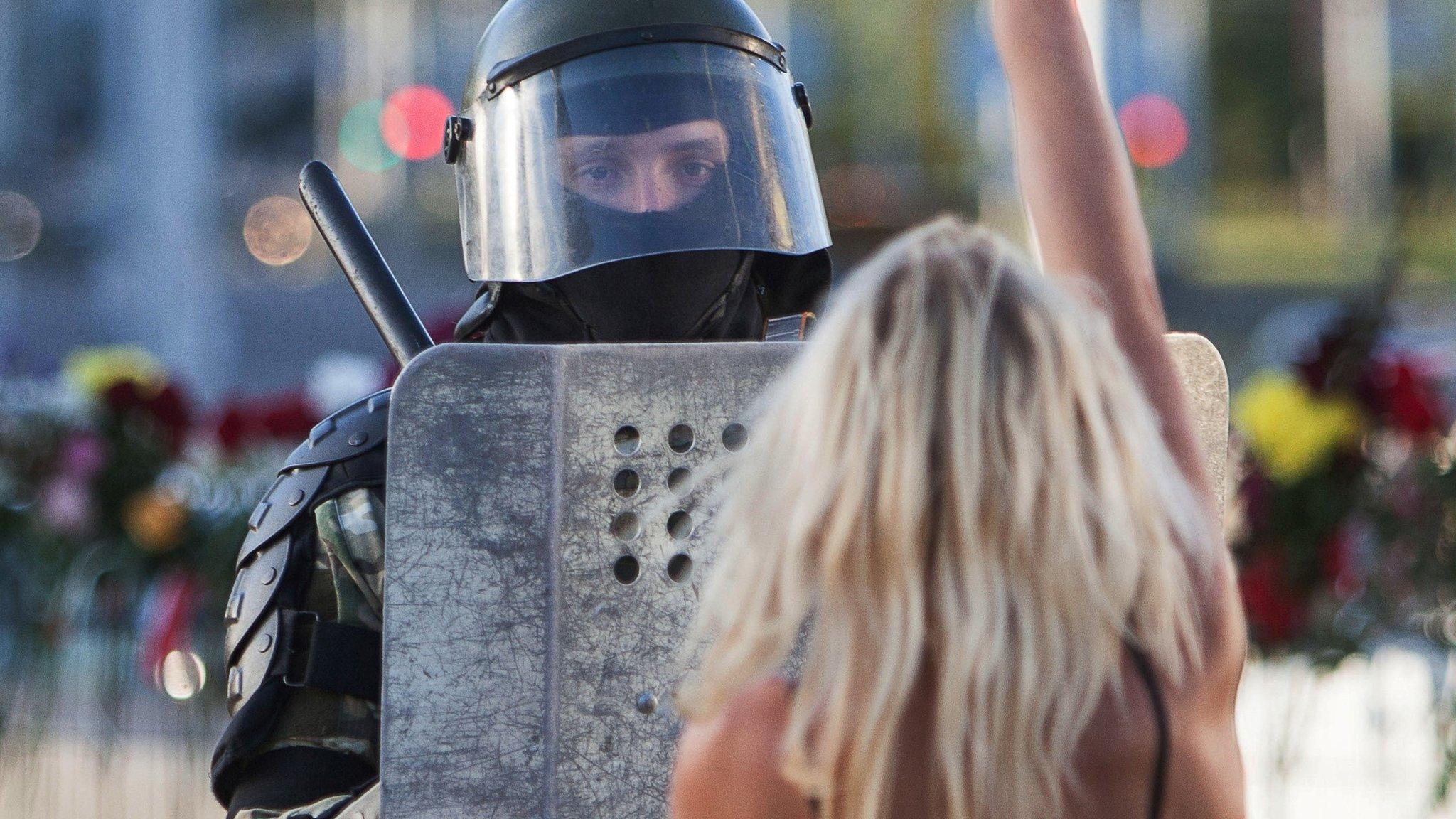
- Published12 August 2020
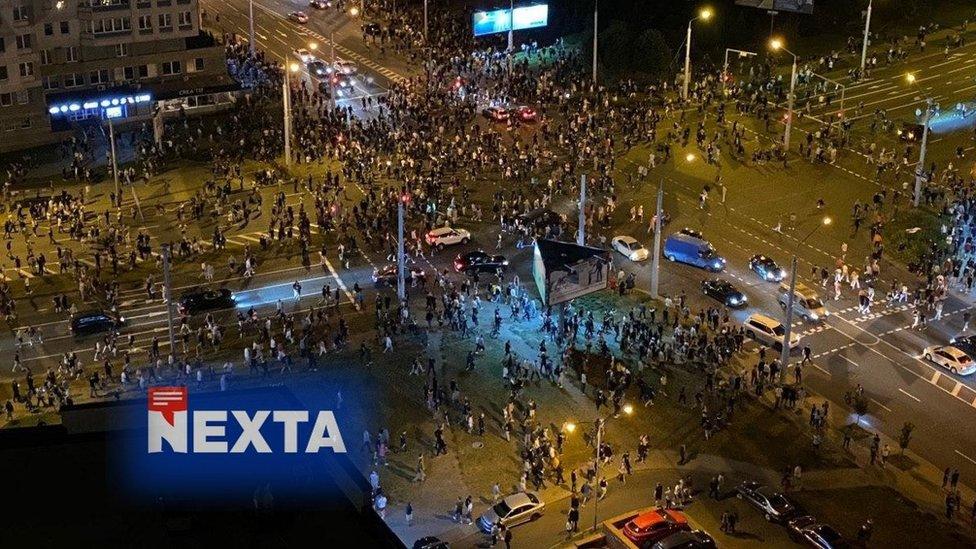
- Published1 August 2020
